Search
Showing 10 of 2157 results for read 2024 FRM Exam Part I - Quantitative Analysis online free
-
Europe market update for secondary schools
As the sector rebuilds capability and welcomes international students back to New Zealand, this session will provide valuable information to secondary school staff wanting to refresh their knowledge or learn more about working with education agents and recruiting school students in Europe.
We are hosting one 1.5-hour Zoom session on Thursday 16 March from 3.30-5.00pm NZT.
The session will introduce schools to ENZ’s Europe team, provide an update on the market, and have guest speakers on hand to share their experiences of working in Europe.
In previous years, many students from Germany, France and Italy have travelled to New Zealand on student exchanges, seeking new experiences at New Zealand high schools. These countries are a priority focus for ENZ staff based in Europe.
In 2019, 1855 German students, 406 Italian students, and 370 French students spent time studying in New Zealand high schools. At least 66% of German international students were enrolled in schools in 2020, making this the largest subsector for Germany students.
Register for the session here.
Visit IntelliLab here to learn more about the Europe market.
-
Applications open for group Prime Minister’s Scholarships to study in Asia and Latin America
Applications from groups, institutions or organisation who can meet the objectives of the scholarship are welcome. Last year, successful group applicants included marae, whānau Māori trusts, tertiary providers, non-profit organisations and more. Applications close on 23 April 2023.
ENZ’s General Manager Sector Services, Sahinde Pala, says the scholarships are a wonderful opportunity for New Zealanders to gain transformational education experiences in Asia and Latin America.
“We love how the scholarships allow New Zealanders from a wide range of backgrounds to continue to add a global aspect to their learning, and make meaningful, often lifelong connections with people from other countries and cultures.
Applicants are invited to think differently about what overseas learning opportunities could enrich the lives of learners or members of their community, and how they contribute to New Zealand more broadly.”
The Prime Minister’s Scholarships are funded by the New Zealand Government and administered by Education New Zealand Manapou ki te Ao to support New Zealanders on learning experiences in Asia and Latin America.
The Scholarships’ group programme offers a flexible way to organise learning experiences in Asia and Latin America. Groups apply for a certain number of people, minimum of three, and once a programme is awarded, the organiser will run their own process to select the members who make up the group based on guidelines provided by ENZ.
Scholarship awardees from the 2022 group round have engaged in a diverse range of programmes, including customised indigenous-to-indigenous cultural exchange, advancing their language skills, learning new fashion design skills, and more.
Participants in a group programme simply need to meet the same eligibility requirements as individuals, including being a New Zealand citizen or permanent resident at least 18 years old at the date of applying.
Since its launch in 2013, the Prime Minister’s Scholarship programme has seen nearly 3,000 recipients, which helps New Zealand continue to engage with key partners in Asia and Latin America.
Applications for student groups from wānanga, universities, Te Pūkenga, private training establishments, iwi and other organisations will be open from 8 March – 23 April 2022, with successful applicants advised in early June.
More information is available on ENZ's dedicated scholarship website here.
A list of successful applicants from the 2022 group scholarship round is available here.
ENDS
Media contact:
Sai Raje
Senior Communications Advisor
021 479 649
Scholarship queries: scholarships@enz.govt.nz
Education New Zealand (ENZ) is a New Zealand Government agency dedicated to international education. ENZ promotes New Zealand as a study destination globally and supports New Zealanders to broaden their horizons through international education experiences beyond our shores.
-
Around the world in five
Asia
Australian TNE looks to India as countries recognise qualifications
Australia and India have signed a qualifications recognition agreement, which comes after Deakin University's announcement of plans to open a campus in India. The recognition agreement is expected to support transnational education and allow students with Indian qualifications to pursue further education in Australia and vice versa.
North America
US educators concerned over new rules on 'third-party' relationships
International educators in the USA are concerned that new Department of Education guidance and oversight of third-party relationships could have negative impact on international student recruitment.
South America
These are the best universities in Latin America in 2023
Latin America and the Caribbean (LAC) has seen a record 140 universities from 12 countries ranked in the Times Higher Education (THE) university rankings 2023, with many of the top region’s universities situated in Brazil.
Europe
New poll reveals public support for international students in the UK
Results from a new poll show that the UK public is positive about the contribution that international students make to the economy, institutions and academic research.
Africa
Visa crisis is jeopardising internationalisation efforts
South African universities face challenges in their internationalisation efforts due to a visa crisis that is affecting international students and staff.
-
International study experience in Brazil excites scholarship recipients
A group of 15 students from the universities of Auckland and Waikato have recently returned to New Zealand after a month’s study in Brazil focusing on history and rights of indigenous people.
The students are group recipients of the Prime Minister’s Scholarship for Latin America, which promotes international study opportunities for New Zealanders.
The group’s itinerary included lectures and field trips around Brazil, including Brasília, São Paulo, the largest city in the southern hemisphere; and Ubatuba, a beautiful, coastal city that joins the Atlantic Forest to the ocean.
Students had the opportunity to meet local indigenous communities such as the Guarani and share their experiences and stories of Aotearoa New Zealand. They discovered the challenges and difficulties faced by indigenous people in Brazil, as well as the richness of their ways of life, music and handicrafts, as well as their connection to their spiritual world.
One of the highlights for the students was their visit to the recently opened Museum of Indigenous Cultures in São Paulo, which offered them a glimpse of the contemporary expression of Brazilian indigenous art, with diverse manifestations such as photography, hip-hop and art installations with social protest.
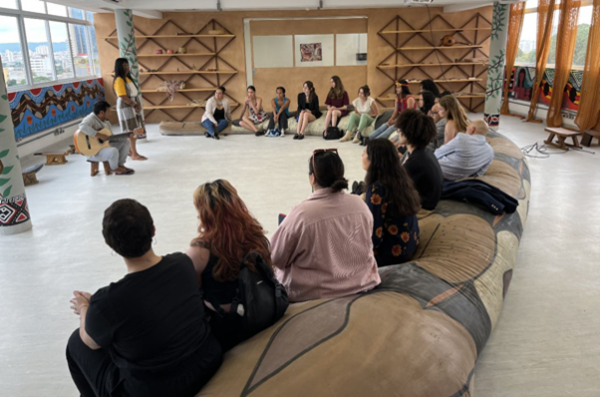
Members of the Museum of Indigenous Cultures perform a traditional song for visiting students from New Zealand.
The ENZ team in Brazil closely followed the journey of the scholarship recipients across the country.
ENZ’s Senior Market Development Manager – Brazil, Bruna de Natale said the students’ visit was a wonderful opportunity that has further grown the rich, cultural, and academic connections between Brazil and New Zealand.
“We were pleased to see how deeply the students immersed themselves in learning about history and indigenous rights in Brazil and make connections with indigenous communities in the country. It’s amazing to see the Prime Minister’s Scholarships for Latin America enable this rich exchange of ideas and knowledge between New Zealand and Brazil,” de Natale said.
The four-week visit ended in Brasília, where the students synthesised their learning in Brazil by presenting original projects that promote the connection between the indigenous cultures of Brazil and Aotearoa New Zealand.
The students’ insights are also captured on video that can be viewed here on LinkedIn.
-
Growing New Zealand’s education connections in the Middle East
ENZ participated in the re-opening ceremony and stressed the importance of education connections between New Zealand and Saudi Arabia to a 300-strong audience.
A rousing performance of ENZ’s waiata – Manapou ki te Ao – by Ngāti Koraha, a kapa haka group based in Dubai, supported the embassy’s re-opening ceremony.
The event took place in the same week that University of Otago alumna, Rayyanah Barnawi, made the news as she is set to be Saudi Arabia’s first woman astronaut in space when she travels to the International Space Station later this year.
The visit was a useful opportunity to engage on education with Saudi Arabian government officials and to discuss G2G opportunities with NZ Inc agencies in the wider Middle East region.
ENZ’s Senior Advisor for the Middle East, Bronwyn Shanks, said the visit has been valuable in the way it has helped ENZ to lay the groundwork for an education delegation to the Middle East, including Oman, the United Arab Emirates, and Saudi Arabia in May.
“We understand the significance of the Middle East region for our education sector, particularly Te Pūkenga, universities, English language schools and edtech companies.
“We’re building knowledge and connections on the ground that can help open doors for New Zealand education providers looking to grow their links in the region and look forward to supporting them with a high-level education delegation visit.”

ENZ’s Bronwyn Shanks speaking at the New Zealand Embassy re-opening event, with Ngāti Koraha kapa haka group in support
Alongside the embassy’s re-opening event in Riyadh, ENZ and representatives from the University of Waikato and the University of Auckland met with Saudi government connections, including the National Institute for Educational Professional Development (NIEPD), Technical and Vocational Training Corporation (TVTC), Ministry of Culture, and Ministry of Tourism.
The discussions’ focus was on how New Zealand education providers could support Saudi Arabia’s efforts towards upskilling their young people under Vision 2030.
“It was great to meet some of those young alumni hosted by the University of Waikato and hear about the positive impact their New Zealand education experience continues to have now they are back in Saudi Arabia,” Shanks said.
ENZ and the University of Waikato also visited the University of Wollongong in Dubai, one of a network of study centres under university consortium NCUK, with which ENZ and all eight New Zealand universities have a partnership agreement to provide in-country foundation programmes.
Education providers interested in knowing more about education engagement in the region can contact ENZ’s Senior Advisor for the Middle East, Bronwyn Shanks, on bronwyn.shanks@enz.govt.nz.
-
First marae-led Prime Minister’s Scholarships for Asia recipients build indigenous connections in Japan
The first marae-led Prime Minister’s Scholarships for Asia recipients (members of Te Piruru Papakainga, Ngāti Maniapoto) visited Japan for a six-week visit that included a customised internship that connected them with indigenous Ainu organisations and villages in Hokkaido.
ENZ’s Manukura Chief Advisor Māori, Ed Tuari and Director of Education – Japan, Misa Kitaoka, welcomed the scholarship recipients in Tokyo in early January.
This is a great outcome for the Prime Minister’s Scholarship Programme, which has seen an increase in Māori participation. The latest round of applications for the scholarships saw an increase in Māori participation to 22 percent in 2022 from 5 percent from 2016 to 2019.
ENZ is eager to continue partnering with iwi, marae and whānau groups to raise Māori participation in the Prime Minister’s Scholarship programme, particularly in the current group round that opened for applications in March.
ENZ’s Manukura Chief Advisor Māori, Ed Tuari said it was a privilege to participate in what is an important milestone for building indigenous connections between Māori and the Ainu people of Japan.
“This is a significant achievement for ENZ Manapou ki te Ao. I want to acknowledge this collective achievement as we break new ground with this marae-led group of PMSA recipients.
“It’s hugely encouraging to see the increase of Māori participation in the latest round of the scholarships. This is a demonstration of ENZ ‘walking the talk’ to ensure Māori are better represented in opportunities to share and learn on the global stage, as well as promote indigenous to indigenous exchanges.”
ENZ’s Director Scholarships Carla Rey Vasquez said she was excited to see the growth and learnings that these programmes would bring to the wider whānau and iwi.
“Our scholarship recipients cherished the opportunity to connect with indigenous communities in Japan, and they particularly appreciated the value of reciprocity as well as the importance of generational knowledge being shared along.
“We look forward to continuing to raise Māori participation in the Prime Minister’s Scholarship programme.”
The latest visit by scholarship recipients has also been a good opportunity to enrich the existing education connections between New Zealand and Japan under a Memorandum of Understanding between New Zealand and the Hokkaido Government, which was renewed in 2022.
The customised internship that saw scholarship recipients visit Ainu villages and organisations, was organised by the Hokkaido Government and the Hokkaido Board of Education.
ENZ’s Director of Education – Japan, Misa Kitaoka, said the visit by scholarship recipients was timely as Japan starts to promote Ainu history, language and culture.
“The Ainu people received official recognition as ‘indigenous people of northern Japan’ from the Japanese government in 2019. As the government begins to promote Ainu history, language, and culture in Japan, Ngāti Maniapoto’s visit to Hokkaido was timely and appreciated by the Ainu community to learn about how New Zealand society has embraced Māori language and culture.”
Applications are open for the 2023 group round of the Prime Minister’s Scholarships for Asia and Latin America until 23 April 2023. More information on applications is available on ENZ's dedicated scholarship website here.
[updated 18 April 2023]
-
International students welcomed across New Zealand
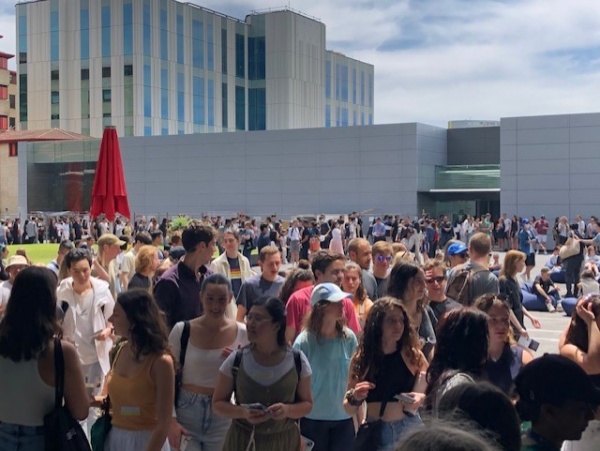
In February, hundreds of international students gathered at a University of Auckland orientation event. ENZ’s Student Experience Manager, Ross Crosson, says, “The wait, for many, has been long but there was a very positive vibe in the air.”
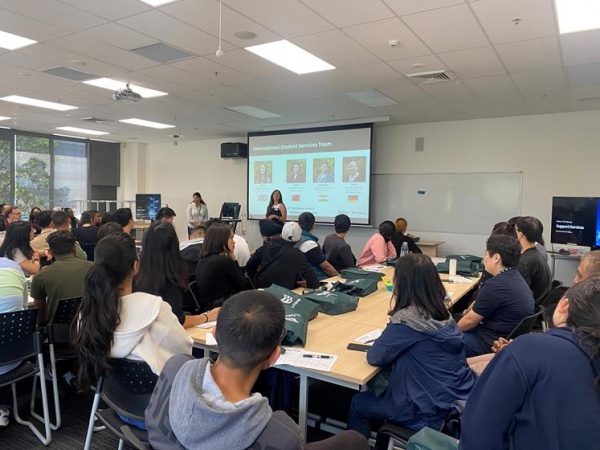
In Hamilton, the Wintec | Te Pūkenga International student services team held an interactive event to welcome students on campus. They used a range of activities to create connections amongst the students and to familiarise them with student support services available.
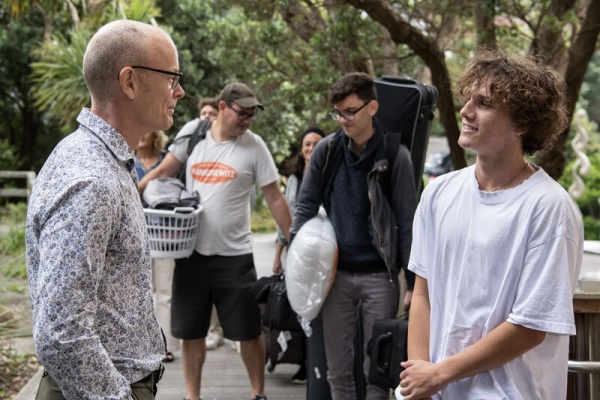
Over in Wellington, Victoria University of Wellington Vice Chancellor Nic Smith took the opportunity to connect with students face-to-face as they were settling into halls of residence.
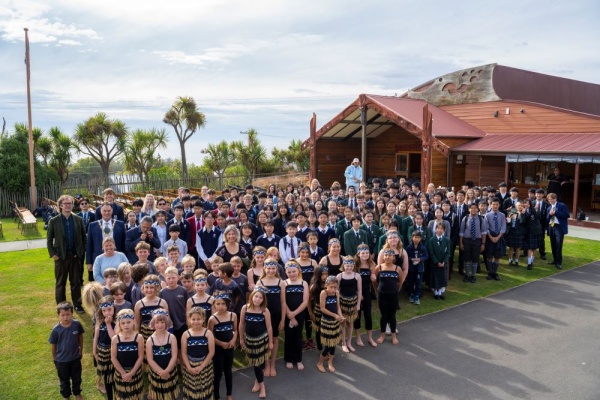
More than 150 international students from 11 local secondary schools were welcomed into Dunedin at Puketeraki Marae on 8 March. In the event organised by Enterprise Dunedin and Kāti Huirapa Rūnaka ki Puketeraki, the guests spent the morning at the pōwhiri, which was accompanied by pupils from Waitati School kapa haka group, and then enjoyed a kōrero and some kai.
-
From the CE: New Zealand education promotion continues at pace
I can assure you I have never seen as much interest in New Zealand as an education destination. Despite the challenges we’re all aware of and the activities of our competitor countries, the New Zealand education offering remains attractive. We all must continue to tell the New Zealand education story.
On Friday 17 March, Minister of Education Jan Tinetti announced new appointments to our Board. I want to acknowledge outgoing Board Chair, Steve Maharey, and welcome Tracey Bridges to the role. Steve has been a stalwart and tireless advocate for international education, both in the community and the corridors of power for over 30 years. In his time as our Chair, he has seen and contributed to enormous change within the sector and ENZ. Personally, I have appreciated his deep understanding, straight talking and clear direction.
Tracey Bridges has knowledge of regional economic development, expertise in strategy, risk and reputation management, and in social marketing. She is Chair of the Wellington Economic Development Agency Limited (WellingtonNZ), co-founder of The Good Registry and sits on the Boards of Sky Stadium, Whānau Āwhina Plunket, the Wellfed NZ Trust and the Digital Media Trust.
Tracey is joined by Dr Therese Arseneau. Dr Arseneau also has knowledge of economic development including international education’s contribution to regional economic development, and governance experience in the tertiary sector at the Ara Institute and the Open Polytechnic. She previously chaired Regenerate Christchurch and Enterprise North Canterbury.
We all know that the contribution of international education is far broader than just the direct and immediate economic impact of the students that come to New Zealand. For the first time, ENZ along with EY have sought to quantify the extent and the value of these wider benefits.
Research commissioned by ENZ that will be released before the end of March found that international education is not only a significant contributor to the New Zealand economy but also that international students living and working in the country bring in a raft of social, cultural, and international benefits. It goes on to explore the extent of the indirect longer-term contribution to New Zealand’s GDP from the small proportion of international students that remain in New Zealand on completion of their studies. The research also quantifies the impact of the pandemic.
Look out for the formal release and when it is available I urge you to download the report from Intellilab.
To complete your international education-related reading list, our Briefing to the Incoming Minister, Minister Tinetti is now available here on the ENZ website. The BIM, as it is known, is prepared when new Ministers are appointed to portfolios.
He maurea kai whiria! – Ignore small matters and direct effort toward important projects!
Ngā mihi nui,
Grant McPherson
-
Applications are open for the Europe and Latin America Engagement Fund
The aim of this funding is to support engagement activities with education agents from Europe, Brazil and Colombia. New Zealand institutions are welcome to submit proposals and apply for up to $3000 per project. We will fund up to 15 projects that focus on engaging with agents from Europe, Brazil and Colombia.
ENZ’s Market Development Manager – Europe, Adina Stoye, said ENZ has a strong and loyal network of agents in Europe, especially Germany and Italy.
“They are keen for support and engagement with New Zealand institutions, and welcome opportunities for events and promotional activities. This initiative is a wonderful opportunity for New Zealand education providers to promote their education offering through building education agent networks.”
Proposed activities should be completed during the second half of 2023 and have firm goals and outcomes in place. Examples of activities are a scholarship campaign, contribution to bringing an agent to New Zealand for a famil, or supporting a trip to attend an event organised by agents.
ENZ’s Director of Engagement – Latin America, Javiera Visedo said education agents in Latin America are keen to learn more about what a New Zealand education has to offer, with students excited at the prospect of studying here. Reconnecting with New Zealand education providers is a top priority for them.”
Applications are open to New Zealand institutions only. This includes New Zealand education providers such as universities, Private Training Establishments (PTEs), English Language Schools (ELS), regional economic development agencies, schools, and peak bodies. Some providers may wish to work together to submit their applications, for example high schools or ELS.
To apply, visit this page. Once applications close, they will be reviewed by a panel of ENZ staff according to the guidelines included on page 5 of the Request for Proposal document.
We will host an information session about the funding and how to apply on Thursday 27 April at 9 am. To register for the session, fill out the form here.
- Applications are open until Friday 12 May at 5pm and applicants will be notified of the outcome on Friday 9 June.
-
Report concludes international education can recover and grow
In 2019, international education’s direct financial contribution to New Zealand’s GDP was $3.7 billion using the Computable General Equilibrium (CGE) methodology. This contribution was reduced to an estimated $0.8 billion in 2020 by the pandemic. The CGE methodology applied by EY to determine the contribution was supported by MBIE and MoE and is more rigorous than previous analyses.
Having established the direct financial contribution, EY explored the extent of the indirect longer-term contribution to New Zealand’s GDP from the small proportion international students that remain in New Zealand after completion of their studies.
EY found that international students living and working in New Zealand in 2019 and 2022 contributed economic, social, cultural, and international benefits. Using NZ Statistics Department IDI data and CGE modelling, EY found that these students contributed in the order of $6 billion in the form of labour supply and productivity to New Zealand’s GDP in both 2019 and 2022.
Determining this contribution involved estimating the GDP output and wage impacts associated with New Zealand educated international students who remained in New Zealand and transitioned into the domestic workforce in the 10 years leading up to each year.
ENZ Chief Executive, Grant McPherson said, “This report confirms the tough time the sector has had over the past two years, highlights the contribution it made in the past, the contribution it makes beyond economic value, and tells us that it is possible to become a vibrant, sustainable and resilient sector in the future.”
The majority of international students, 62%, return to their country of origin after they have completed their studies. A further 13% leave New Zealand after their post-study work experience meaning that in total 75% have returned home after three years, according to the research.
More broadly, EY concluded there is evidence that international education can enable New Zealand students to develop global competence within a structured teaching environment, and contributes to soft power in diplomacy, trade and perceptions of New Zealand through a range of mechanisms. Broader impacts for Māori are potentially also present across each area of impact from international education. These impacts were not directly quantifiable.

For a full-size image of the infographic, click here. For a full copy of the report, click here.


